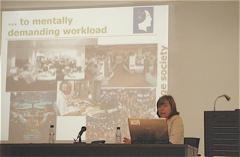Proceedings of FSWKS_06 conference abstracts
International Conference on "Foresight Studies on Work in the Knowledge Society"
UNL Campus od Caparica, 19 and 20 October 2006
Portugal
UNL Campus od Caparica, 19 and 20 October 2006
Portugal
Ergonomics and Usability key factors in Knowledge Society
Title:
"Ergonomics and Usability key factors in Knowledge Society"
Author:
Isabel Lopes Nunes
(FCTUNL, Monte de Caparica, Portugal)

During the recent years human society evolved from the industrial society age and transitioned into the knowledge society age. This means that knowledge media support migrated from pen and paper to computer-based Information Systems (IS).
This evolution introduced some technological, organizational, and methodological changes affecting the demand, work-load and stress over the workers, many times in a negative way. Due to this fact Ergonomics has assumed an increasing importance, as a science/technology that deals with the problem of adapting the work to the man, namely in terms of Usability.
The main Ergonomics domains are Physical Ergonomics (related with physical and physiological loads), Cognitive Ergonomics (related with mental processes) and Organizational Ergonomics (optimization of sociotechnical systems). All of them aim to contribute to the design and evaluation of tasks, jobs, products and systems in order to make them compatible with the needs, abilities and limitations of people.
Usability is then a key issue on ergonomic interventions regarding IS. Usability can be defined as a quality or characteristic of a product, denoting whether it is efficient, effective and satisfying for those who use it. However, Usability is also an ergonomic approach and a group of techniques aimed at creating such products, based on a user-centered design.
Key-word:
Ergonomics; Usability; User-centered design
"Ergonomics and Usability key factors in Knowledge Society"
Author:
Isabel Lopes Nunes
(FCTUNL, Monte de Caparica, Portugal)

During the recent years human society evolved from the industrial society age and transitioned into the knowledge society age. This means that knowledge media support migrated from pen and paper to computer-based Information Systems (IS).
This evolution introduced some technological, organizational, and methodological changes affecting the demand, work-load and stress over the workers, many times in a negative way. Due to this fact Ergonomics has assumed an increasing importance, as a science/technology that deals with the problem of adapting the work to the man, namely in terms of Usability.
The main Ergonomics domains are Physical Ergonomics (related with physical and physiological loads), Cognitive Ergonomics (related with mental processes) and Organizational Ergonomics (optimization of sociotechnical systems). All of them aim to contribute to the design and evaluation of tasks, jobs, products and systems in order to make them compatible with the needs, abilities and limitations of people.
Usability is then a key issue on ergonomic interventions regarding IS. Usability can be defined as a quality or characteristic of a product, denoting whether it is efficient, effective and satisfying for those who use it. However, Usability is also an ergonomic approach and a group of techniques aimed at creating such products, based on a user-centered design.
Key-word:
Ergonomics; Usability; User-centered design